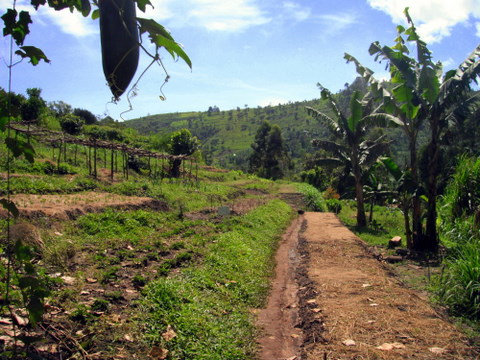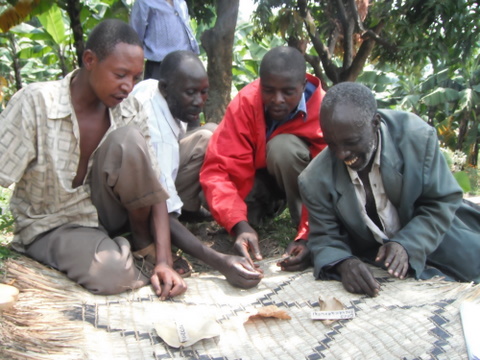|
Ecotourism slots into a broader movement in
conservation and development circles, namely integrated conservation and
development programmes (ICDPs). ICDPs offer communities living in close
proximity to protected areas alternative livelihood options (in order to
(1) defer a perceived environmental threat, and (2) alleviate poverty).
In 2009 alone, Bwindi Impenetrable National Park (BINP)
attracted some 11,097 visitors. However, this growing industry has not
seen a great amount of local development. Research by Dr. Christopher
Sandbrook in 2004 revealed that over three quarters of income from
Bwindi’s tourism industry goes to outside actors in tour camps (called
‘leakage’) and so far few partnerships between the tour camps and local
farmers exist. Only few local residents benefit from Bwindi’s
ecotourism, mostly male, educated, and well connected (Sandbrook, 2006).
 The
Advanced Market Gardener’s Association (AMAGARA) has sought to convert
this scenario. The association provides local farmers with seeds,
skills and the middle-men to sell their produce to local tour camps.
Members can take their fruits and vegetables to AMAGARA and get 90% of
the sales price. The 10% is set aside to pay salaries of staff and
casual labourers, and other running costs. A secondary objective isthat
the benefits gained will stimulate members to conserve and protect the
area’s rich biological diversity. The
Advanced Market Gardener’s Association (AMAGARA) has sought to convert
this scenario. The association provides local farmers with seeds,
skills and the middle-men to sell their produce to local tour camps.
Members can take their fruits and vegetables to AMAGARA and get 90% of
the sales price. The 10% is set aside to pay salaries of staff and
casual labourers, and other running costs. A secondary objective isthat
the benefits gained will stimulate members to conserve and protect the
area’s rich biological diversity.
The aim of this MSc thesis was to assess the
development and conservation impacts of AMAGARA. Four key research
questions guided the study:
1. What are the characteristics of members of AMAGARA,
and are these different from those of people able to access tourism
benefits in the past?
2. Has AMAGARA reduced leakage of tourism revenue
from Bwindi?
3. Has joining AMAGARA resulted in increased income
for members?
4. Has joining AMAGARA resulted in more positive
attitudes towards tourism and the conservation of Bwindi Impenetrable
National Park?
The research has shown that AMAGARA has created an
opportunity for ecotourism revenue distribution to individuals
previously left out of the equation. However, those who had the higher
incomes already still dominate the local tourism sector.
While the Association has managed to avail some more
revenue from tourism to local farmers , seasonality of produce and
tourism peaks present a major obstacle to provide the tour camps with
local produce throughout the year and the farmers with a steady offtake.
 The
question whether membership has a positive impact on attitudes and
interaction with the natural environment could not be answered
satisfactorily. AMAGARA members do not report different environmental
sentiments from those of non-members, but it has been shown that they
undertake more local level conservation activities. The
question whether membership has a positive impact on attitudes and
interaction with the natural environment could not be answered
satisfactorily. AMAGARA members do not report different environmental
sentiments from those of non-members, but it has been shown that they
undertake more local level conservation activities.
AMAGARA has brought other, unexpected benefits to
members, notably access to greater variety in nutrition as well as
possible psychological reward via status change due to increased income
and expertise.
Finally, since AMAGARA set out to distribute tourism
benefits more widely within the local population, it is proposed that
gender be more carefully considered, perhaps through setting male:
female membership ratios. There is a risk that men will take more
control of the fruits of women’s labour as the products gain value. This
could be significant, since men are less likely to spend additional
money on better nutrition for their children and rather sell crops for
alcohol.
The thesis concludes that AMAGARA battles with issues
common in ICDP projects: the intentions are excellent but the full
development and conservation potential has not been achieved. Should
business-as-usual persist it is unlikely that AMAGARA will attain
financial sustainability in the foreseeable future. This would be
unfortunate as, for the farmers around Bwindi, it represents the major
platform for livelihood improvement.
|


 The
Advanced Market Gardener’s Association (AMAGARA) has sought to convert
this scenario. The association provides local farmers with seeds,
skills and the middle-men to sell their produce to local tour camps.
Members can take their fruits and vegetables to AMAGARA and get 90% of
the sales price. The 10% is set aside to pay salaries of staff and
casual labourers, and other running costs. A secondary objective isthat
the benefits gained will stimulate members to conserve and protect the
area’s rich biological diversity.
The
Advanced Market Gardener’s Association (AMAGARA) has sought to convert
this scenario. The association provides local farmers with seeds,
skills and the middle-men to sell their produce to local tour camps.
Members can take their fruits and vegetables to AMAGARA and get 90% of
the sales price. The 10% is set aside to pay salaries of staff and
casual labourers, and other running costs. A secondary objective isthat
the benefits gained will stimulate members to conserve and protect the
area’s rich biological diversity. The
question whether membership has a positive impact on attitudes and
interaction with the natural environment could not be answered
satisfactorily. AMAGARA members do not report different environmental
sentiments from those of non-members, but it has been shown that they
undertake more local level conservation activities.
The
question whether membership has a positive impact on attitudes and
interaction with the natural environment could not be answered
satisfactorily. AMAGARA members do not report different environmental
sentiments from those of non-members, but it has been shown that they
undertake more local level conservation activities.